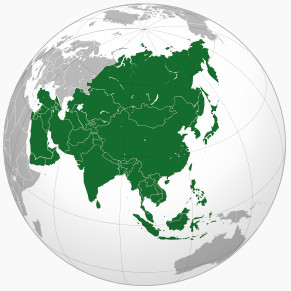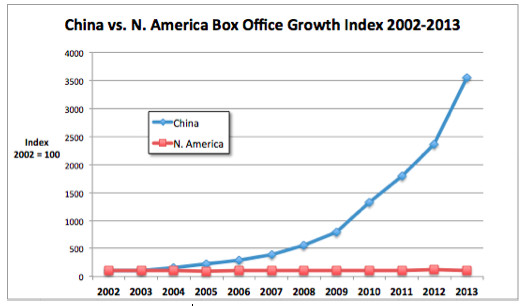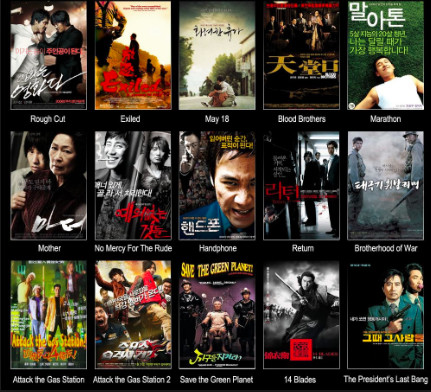Why Creatives Need To Think China
 Richard "RB" Botto
Richard "RB" Botto Today's blog is a guest blog from Stage 32 member Mimi Chen. Mimi is a multi-talented actor, singer, and dancer, but is best known for being an FM rock radio DJ. Being an Asian American in the entertainment industry, Mimi has faced frustrating stereotyping and casting - something any minority creative can relate to.
In this entry, Mimi points out that creatives who aren't thinking about China and Asian influences are falling behind. She discusses the lack of accurate Asian representation in film and TV, and goes on to explain why filmmakers need to be taking China into consideration when not only casting their films, but during the foreign pre-sales and distribution processes as well. Using statistics and her own personal experiences, Mimi aims to inspire anyone who feels "no one in the movies looks like me" to rethink the future of filmmaking.
I thank Mimi for her contribution to the Stage 32 Blog.
Cheers,
RB
As a young Chinese-American, I grew up thinking I wasn’t important in American society. This is because every time I turned on the TV, all I saw were white people playing the leads on the shows and all the commercial advertisements. Asians were non-existent on TV.
Our family suffered particularly during the 70’s when anti-Asian sentiment was high due to the attitudes created by the Vietnam war. Racist attitudes towards Asians still are rampant, even though everyone ignores the idea or claim it doesn’t exist. A couple of years ago I walked into a movie theater and the woman next to me in line turns towards me and says, “This country wouldn’t be in such bad shape if it wasn’t for you gooks.”

When I began my “Hollywood” acting pursuits around 10 years ago, the majority of roles I auditioned for came with the caveat that I needed to speak with a heavy Chinese accent and poor grammar. For years, Hollywood writers/producers portrayed Asians as “foreign” - so that even though I was born and raised in America, I was just another visitor.
It’s beginning to change though, and lately half of my auditions seem to require a regular American accent. I celebrate every time I don’t have to speak pidgin English. Could it be, after all this time, people think Asian people can be American too?
In terms of dollars earned by Hollywood movies, for a long time, the USA reigned supreme, but now, when it comes to worldwide figures, you know that is not true. There are 1.36 billion people in China, 1.25 billion in India, and only 318.9 million in the USA. China is 4 times bigger than the US. Why do I point this out? Because we all know economically, we’ve changed to a global perspective.

By virtue of size, in today’s global economy, everyone needs to pay attention to China. ONE out of every 5 persons in the world are Chinese and these people are getting to the point where they have lots of money to spend.
Currently, the burgeoning Chinese economy consumes movies to the point that 1 out of every 5 box office dollars earned was generated from China. Sure, it’s been about neck and neck with the US, although just recently, the box office revenue from China topped the US for the first time in February, earning $650 million to the $640 million logged in the US for that month.
This trend, of course, will continue their upwards swing, as we’ve watched the yearly box office take from China rise in 1999 from 100 million to 900 million in 2009. Unlike the USA where movie theaters are closing at a rapid rate thanks to streaming services such as Netflix, apparently there is a construction frenzy going on in China for new movie theaters. And the Chinese are flocking to those theaters in droves.

Photo credit: chinafilmbiz.com
Is Hollywood taking notice of this? The answer is yes, the big studios negotiated for several years to increase the quota of foreign movies released in China every year, set at 20, but they are now allowing 14 more films to be released provided they are in Imax or 3D formats. The deal also allows foreign film-makers to keep a bigger share of box office takings. The good news for indies is their take is now up to 25% vs. the previous 13%. In addition to the 20 blockbusters released in China, 40 independent foreign films are also allowed into China yearly.
From my lowly perspective all this attention focused on China in the movie making business makes one hopeful Asians will be allowed to take the lead once in a while in a regular US production. After all, most people don’t blink an eye when they see Blacks and Hispanic actors cast as major leads, so why not...Asians? It’d be cool to see this happen especially in movies that aren’t just another sequel to Harold and Kumar and who don’t star a guy named Jackie Chan (even though we love him).

And, of course, maybe if they’d want to increase their appeal to Asian audiences, they’ll cast more Asians in character work for those of us who are Asian character actors!
Of course, this is wishful thinking on my part. I’ve no doubt that the American movie making industry will blithely march on with their emphasis on white male leads (don’t get me started on the lack of roles for women), but I’m hoping diversity programs will succeed in increasing awareness. Asians are, after all, the fastest growing minority population in the US.
Meanwhile, I applaud ABC for their programming of Fresh Off The Boat, a show that finally features Asians in leading roles. No matter your race or gender, I hope this inspires you to not let the excuse of "I don't see anyone like me on TV" stop you from pursuing your dreams.
Like this blog post? Please share it on social media (Facebook, Twitter, LinkedIn, email etc) by using social media buttons at the top of the blog. Or post to your personal blog and anywhere else you feel appropriate. Thank you.
As always, Mimi is available for remarks in the Comments section below.
| Crowdsourcing & Crowdfunding Your Indie Film |
| Guests Announced for On Stage With RB Webinar |
Search Stage 32 Blog
There are now 4042 blog posts for you to enjoy. Search them all by tags below.
Acting, Advice, Cinematography, Coffee & Content, Composing, Contests, Distribution, Featured, Filmmaking, Financing, Inspirational, Networking, Producing, Screenwriting, Success Stories, Tips, Trending,Relevant Tags
Recommended Articles

Coffee & Content: The Genius of Weapons and How to Know When Your Script Is Ready

4 Reasons To Have Audio Description On Your Film

Don't Let the Momentum of November Write Club Die: How to Stay Active Into 2026 & Beyond!

Green Lights and Grey Areas: Expanding Creative Collaboration in Publishing

Forbes Spotlights Stage 32 Certification!

State of the Industry 2026 Now On-Demand: RB & Geoff Break Down What’s Next for Writers!

Coffee & Content: Why Your Next Step Matters More Than the Perfect Step

Insider Intel: The Studio War & The Rise of Indies

How Stage 32 Script Services Make You A Better Writer






